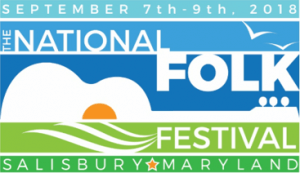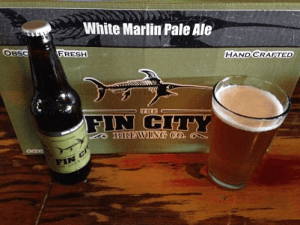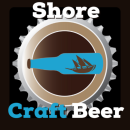A national festival is coming to our region.
The National Folk Festival has been celebrated annually in cities around the U.S. since 1934. The festival commemorates traditional art, food, music and more and is the oldest celebration of multicultural traditional art in America.
Since its beginnings in the ’30s, the Folk Fest has been held in 28 different cities across the nation, and from 2018-2020, the multicultural celebration will have its headquarters in Salisbury, Maryland. This is pretty huge for the city of Salisbury: city officials have reported that the free event is expected to attract around 150,000 people and bring in anywhere from $15 to $30 million to the local economy.

The festival is a major step in the city’s efforts to make Salisbury a national destination for arts and culture, following recent endeavors like the arts and entertainment-centered 3rd Fridays downtown and our own Shore Craft Beer Festival at the Salisbury Riverwalk.
As for the traditional cultural phenomenon that the festival emphasizes, the National Folk Festival website provides a short list of what attendees can expect from the weekend-long event coming this September.
A large-scale, three-day outdoor event presented FREE to the public, the National Folk Festival celebrates the roots, richness, and variety of American culture. It features over 300 of the nation’s finest traditional musicians, dancers, and craftspeople in performances, workshops, and demonstrations, plus children’s activities, savory Southern and ethnic cuisines and craft brews, non-stop participatory dancing, storytelling, parades, and more.
That’s right–in addition to all the fun crafts, music, storytelling, folk life demonstrations and regional cuisine, the National Folk Festival also celebrates craft beer as one integral part of folk culture.
Because how could you celebrate folk culture on the Shore without including our vast array of locally produced craft brews?
Pop Culture vs. Folk Culture
A brief definition. You can skip this part if you’re already well-versed in what’s “folk” and what’s “pop” although sometimes, it can be kind of hard to tell.
The widely, if someone vague definition of folk culture is that it is, 1., passed down through oral tradition within a community, and 2., traditionally and historically practiced by small, homogeneous groups in isolated, rural areas. Popular culture, on the other hand, is found and larger, heterogenous societies who are largely globalized and have access to modern technology and communication systems.
Fun fact. The earliest known presence of beer is in Mesopotamia (modern Iraq) in 1800 B.C., as documented in a poem to patron goddess of brewing Ninkasi.
But today? It would be absurd to refer to beer as anything but insanely popular nationwide. Material items of popular culture are widespread throughout communities across the nation and enjoyed by people from all walks of life. Every popular bar, wherever you are, carries Budweiser, and its recipe, production style, distribution and marketing make it solely a part of our popular culture, as it has lost its roots in the folk tradition of brewing locally with an eye toward the flavors and styles of the isolated areas in which it developed. It is produced and distributed solely to appeal to a mass national and international market.
While craft beer was once enjoyed by a more local and more niche audience, brands like Sam Adams, Sierra Nevada and even Dogfish Head have found their way into those popular bars, airports and chain restaurants across the country. Boston-ites might have a soft spot for Sam Adams, which originated in their city and is brewed by the Boston Beer Company, but their beer is widely available almost everywhere.
So how do we classify craft beer here on the Shore?
The line separating folk culture from pop culture can be a bit blurry at times, and Delmarva’s craft beer is a little bit of both.
Think about it: It’s a point of pride for many Delmarva craft beer drinkers that Dogfish Head is based in Milton, DE, but they’ve been growing exponentially, especially in recent years. With Dogfish’s wide reach and mainstream appeal, they’ve gone from Milton-based folk culture to popular culture in the span of about two decades.

But even Dogfish, and countless other smaller-scale local breweries, are hugely representative of Delmarva culture.
The roots are in the name. Just a glance at the names of the mainline brews from Ocean City’s oldest brewery Fin City–“OC Reef Red IPA,” “Angler Ale” and their “Catch of the Day” IPA, to name a few–are reflective of the fishing culture and marine life of the Shore. Delmar’s 3rd Wave Brewing Co. is big on surfing, and they pride themselves on being a hometown Delaware brewery located 45 minutes from the Atlantic Ocean. Even Salisbury’s own ever-expanding Evolution Craft Brewing Co. brews a Delmarva Pure Pils, described as “an Eastern Shore take on a Czech-style pilsner,” meant to be paired with steamed crabs, seafood and a boat ride out on the bay.
What’s unique to the environment. Food-and-drink that are considered popular culture also typically outsource for their ingredients. This is sometimes inevitable with beer, depending on where it’s being brewed, but most Delmarva craft breweries use as many local ingredients as is feasible.
Fin City claims the first known stout brewed with live Maryland Blue Crabs in the boil. Big Oyster Brewery in Lewes, DE brews their Big Oyster Stout with oyster shells, incorporated in the boiling process. And while hop farms are few and far between on the Shore, Black Narrows Brewing Co. on Chincoteague Island, VA sources their hops from Dixon Leatherbury’s Seaside Hops farm on the Eastern Shore of Virginia.
Local pride. The pride alone that Delmarva breweries have in the Shore, their general inclination to use locally-sourced ingredients and a “locals first” attitude that’s prevalent even in tourist destinations like Ocean City and Rehoboth Beach work to make Delmarva’s craft beer scene a more modern example of folk culture.
In a globalized 21st century, most of what we consider folk culture is based on tradition from centuries past, when many communities were sheltered and unable to reach the rest of the world. The regional pride and passion of Delmarva’s craft breweries proves that modern folk culture is alive and flourishing and ranks highly with the regional folk traditions soon to be celebrated at Salisbury’s National Folk Festival.
In today’s world, we’re able to bring our folk culture to a wider audience. More valuable yet, to those who love locally-produced craft beer, is the ability to come to Salisbury for the National Folk Festival and sample our world class craft beer. It’s the best of all traditions.
Ann Hillyer contributed to this article.



